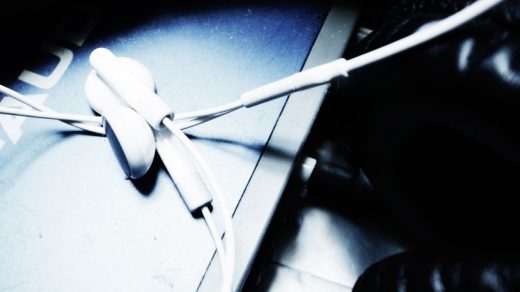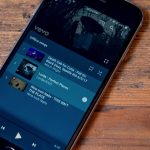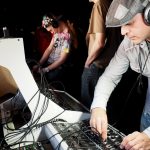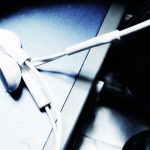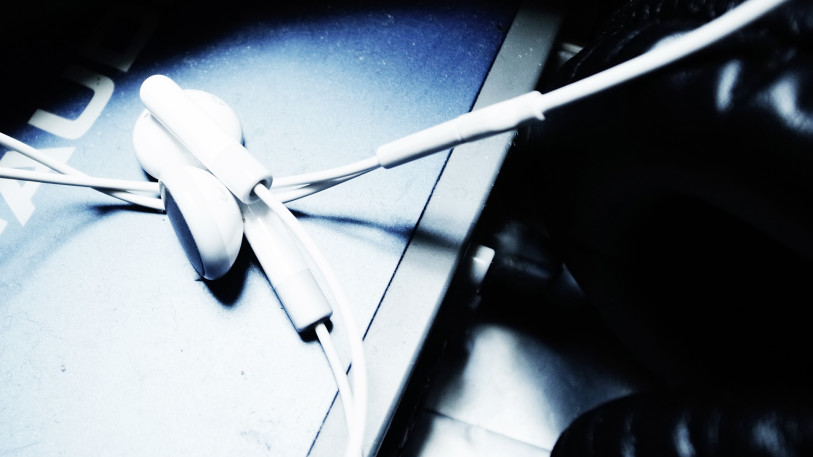The Neuroscience Of Music, Behavior, And Staying Sane In The Age Of Twitter
When it comes to music and the human brain, Daniel Levitin’s expertise is hard to top. The musician, professor, and neuroscientist quite literally wrote the book on the topic when he penned the 2006 bestseller This is Your Brain On Music. His most recent book The Organized Mind furthers his exploration into our brains with a focus on how information overload is affecting cognition and what we can do it about it.
Over the last two years, he’s been working with smart speaker maker Sonos on new research into how music affects people’s minds and behavior at home. As part of its new marketing campaign centered around what the company regrettably diagnoses as “the silent home”–the relative dearth of music being played out loud as families stare into their phones or tune into Netflix–Sonos enlisted Levitin to help design a new survey of people’s listening habits at home. We sat down with Levitin at Sonos’s Boston offices last week for a conversation about science, music, the brain, and how to stay sane in the age of Trump and Twitter.
You’ve been working on some new research into music and people’s lives at home. What are some of the most interesting or unexpected things you’ve learned about how music—or the lack thereof that affects our lives at home?
Levitin: I think one of the most interesting things is the number of people who really don’t have music playing in their homes. It’s quite striking across the nine countries we surveyed. Something as simple as entertaining friends and family: 84% of people in Sweden, 83% of people in the U.K., 79% of people in the U.S. don’t play music when they have friends over. That just seemed surprising and weird to me. I’m of the Boomer generation, so music was just something that you did and it’s the way that you related to other people, and even the generation behind me. These are people from all age brackets. It’s not just the digital natives who aren’t playing music. Nobody is.
Other activities like cooking dinner, doing the dishes, relaxing in the evening and weekend. In Denmark, 69% of people and in France 82% of people did not listen to music to relax for the evening or the weekend. That was one thing that was surprising. The other is the yearning that people have for more contact, juxtaposed with the amount of time they spend in their own isolated, digital words. 86% want to spend more time doing activities in person with others. It’s as though two wheels are in a rut and they can’t figure out how to get back on the road that they used to be on. We’ve got to encourage people to take screen-time breaks and to establish shared spaces in the home where they can enjoy communal activities.
These days, it’s pretty common to go out to a restaurant and see an entire family staring into their phones. What are some of the effects of this isolation and, based on the research you’ve done and seen, what might the impact be of changing these habits?
Levitin: The research on this is still in its infancy, of course. It’s a somewhat new phenomenon, and so any data that we can get is helpful. I think that related to this, we’ve learned recently that kids who don’t interact regularly with their parents but are instead put in front of educational or instructional television don’t learn language properly. Language learning has to be interactive. It can’t be just passive, receptive. I think we’re also seeing that increasingly digital natives are reporting that they’ve got shorter attention spans than non-digital natives. Colleagues of mine at other universities who teach these large classes or even seminars say that in the last few years, a whole new breed of students come up to them during their office hours in the first week of class, say, “Professor, I have to read 20 pages tonight? I don’t know how I’m going to do that. That’s too much.” They are accustomed to being constantly distracted and we know from neurochemical studies, people get addicted to that distraction.
Your book, The Organized Mind, deals with this quite a bit: the information overload and how our digital lives might be affecting our brains. What is your advice for people in the workplace? How do you deal with this deluge of information when you’re trying to be productive?
Levitin: One piece of advice I have is based on our modern understanding of the different attentional modes of the brain. There’s the mind wandering mode, the idea that the brain has this whole separate mode of existing where you’re not in control of your thoughts and they’re loosely connected from one to the next. Often, I think that when we’re at our desks at work or if we’re out in the field doing work, after a certain amount of time, we feel our attention flagging. The modern reaction when that happens is to double down. Maybe have another cup of coffee and keep pushing through.
In reality, your brain is telling you that it needs a break. Taking a break and getting yourself into this mind wandering mode by giving into it for 15 minutes at a time every couple of hours or so, you effectively hit the reset button in the brain, restoring some neurochemicals that had been depleted through focused activity. There are a lot of different ways to get into this mind wandering mode. One of them is listening to music. Another is going for a walk in nature. Listening to nature sounds. Looking at art, reading literature. Not reading Facebook posts. Literature has this special quality that it invites you to let your mind wander. I think that’s part of the answer. Going off and searching the Web for your 15-minute break is not a break.
We’ve grappled with information overload for years now, but in our new political climate, there’s a certain intensity and anxiety that’s now tied to a lot of the stuff that people are seeing online everyday. How do you think this might be affecting people’s mental health? And what should we do about it?
Levitin: My reading of the research is that we really are, as a society working harder than before, but we’re not working as efficiently. We feel overloaded by the onslaught of information, and so I think that creates the conditions in which things like fake news and alternative truth can exist because we just throw up our hands and say, “I can’t deal. It’s somebody else’s job to deal with this, not mine.” I don’t mean to get on a soapbox, but I think that’s when we begin to see democracy falter, when people don’t want to get involved.
I think that we need to recover some sense of community and engagement with one another and with our towns and our neighbors that only comes from face-to-face interaction, not from retreating into our own digital devices. As President Obama said in his exit speech, democracy is not easy and is not free. You have to work for it. I think that work is putting our minds in a state where we can evaluate claims and information and stories as they come by. Evaluate them for ourselves or in discussion with other people. Start talking to people who disagree with us, which has become unfashionable. I don’t mean yelling at people who disagree with you. Just talking.
I’ve had a couple of interesting conversations just in the last few months with people who I disagreed with strongly about a number of political issues, and the conversations were productive because we saw from each other’s point of view how we came to hold those beliefs and discovered that we had really a lot more in common than we had differences. We were able to agree on the facts. As Daniel Patrick Moynihan famously quipped, you’re entitled to your own opinions, but you’re not entitled to your own facts. We agreed on the facts, but our opinions about how to address the problems, we had different views about what would be effective, but we wanted to end up in the same place where people were happy and prosperous and safe. I think that creating shared spaces in the home and shared moments in the home, if music can be part of that or talk radio or just art, some kind of discussion, I think that that’s the antidote to all of this.
It seems like it’s partially a matter of people reconfiguring that balance between their digital lives and the time they’re actually spending face to face. I assume those conversations you refer to weren’t on Twitter or Facebook.
Levitin: One of them was in person. One of them was on the phone. It was 45 minutes long and we talked about a lot of things. This is somebody who is polar opposite of me politically and is quite in the public eye and his opinions are very well known, but I was astonished that we agreed on far more than we disagreed on. I ended up admiring him for his stance for coming to the conclusions he came to, even though I still don’t agree, but I can see how he got there.
This is the conversation that Republicans and Democrats aren’t having anymore. I never thought I’d look back nostalgically at the Johnson presidency, but in the Johnson days, the two parties worked things out. They did that pretty much through more or less through the next couple of administrations. The polarization is a problem, and I think that the digital age has only put a hyper focus on polarization because of the echo chamber that you’ve covered already in your magazine.
You wrote This Is Your Brain On Music in 2006, so it was pre-iPhone, pre-Spotify. It seems like music is more pervasive in people’s lives than ever. How has music—both as an industry and in terms of our relationship with it—changed in the last decade or so?
Levitin: I think we’re living in a golden age of music, as we’re living in a golden age of TV. There’s a lot of creative people engaged in it. The barriers to entry are much lower than they used to be. Anybody with a laptop and a $200 mic can make something that sounds as good as most of the Rolling Stones records that were made in professional studios. That’s great. The problem, of course, is that we haven’t figured out how to monetize it. As Keith Richards said, for a period of time you could make recordings for a living and you could make a good living at it, but those days are gone until we figure something out. We’re living in a world now where a lot of artists have to have day jobs. I would like to live in a world where “artist” is a job and a person can earn a living doing that. I don’t want Bono to be writing songs in his spare time after a day of heavy labor making sandwiches. I want him to be able to devote himself to it.
I would say there’s been a Balkanization of music sources in the way there’s been a Balkanization of the media. When I was a kid, and maybe when you were a kid, you ran into the proverbial man in the street, woman, somebody you didn’t know at a bus stop and you started talking about the news, you probably got your news from one of the same small handful of sources. You agreed what the news was, and you probably listened to music on one of the same two or three radio stations. Now there are thousands of places to get your news, thousands of places to get music, and so the common ground that we share is much less. Sure, there’s still hit songs, but it’s different. I see that changing. There’s good and there’s bad in that. The so-called long tail means that people can really fine tune their musical taste or their taste in books and independent films, find exactly what they love, but at the expense of the shared experience.
I don’t think that there’s any evidence that music is more pervasive. In fact, we found that 60% of people we surveyed said they listen to less music now than when they were younger. I don’t know why that is, because there’s more music available and it’s free, but people don’t make the time for it. It’s not a priority the way it once was. I think that’s a shame. I’m not thinking people should do nothing but listen to music, but as part of a balanced life that involves exercise and a good diet and nature and movies and ballet and literature and all the finer things.
Tell us a little bit about your own music consumption and how it’s evolved. How do you listen music now?
Levitin: I always fantasized in my twenties about buying a physical jukebox from a bar and restoring it. I had a nice collection of 45s. Now I have something even better: I have 20,000 songs on my hard disk and I just stick it in random. I got them in my car now and I have them in my backpack and I have them on my computer and at home, and that’s most of my listening. I have 20,000 of my favorite songs. It’s my own radio station. Anything that comes up, I’m going to like. I may not like it at that particular moment, depending on what I’m doing.
The second source is that friends who are making music send me advances of their stuff. Rodney Crowell, Paul Simon, people that I know who are actively working as songwriters and musicians will send me stuff. A friend of mine who manages Bob Dylan is just sending me the 36 CD boxset. It’s supposed to be there when I get home tonight. I burn the CDs to my hard disk and then put them in the mix.
Then the third source is I stream. Once I got Sonos in the home, I found it easier to deal with things like Spotify and streaming radio and Apple Music. For one thing, they weren’t playing out of these crappy little speakers in the computer. Typically, my wife and I will put one of the jazz stations when we’re in the kitchen cooking and washing dishes and while we’re eating. We hear a lot of good music that way.
How do you find the mental space to focus and be productive?
Levitin: I get more work done on airplanes than anywhere else. I wrote my last two books primarily on airplanes touring for the previous book. You’ve got the white noise of the engine. Somebody bringing you food.
Yeah, it’s great. When I really need to focus, I tend to need to get away from the internet too. I turn off Wi-Fi. Sometimes I leave my phone at home to avoid the distractions.
Levitin: I do that once in a while and it’s very refreshing. My wife and I hike a lot, because we’re in California. So we’ll go and we just won’t bring the phones. We’ll bring them in the car in case we have a breakdown or something, but when we’re hiking, no phone and it’s lovely.
Speaking of California, I just called an Uber because I have to get myself to the airport.
Fast Company , Read Full Story
(54)

